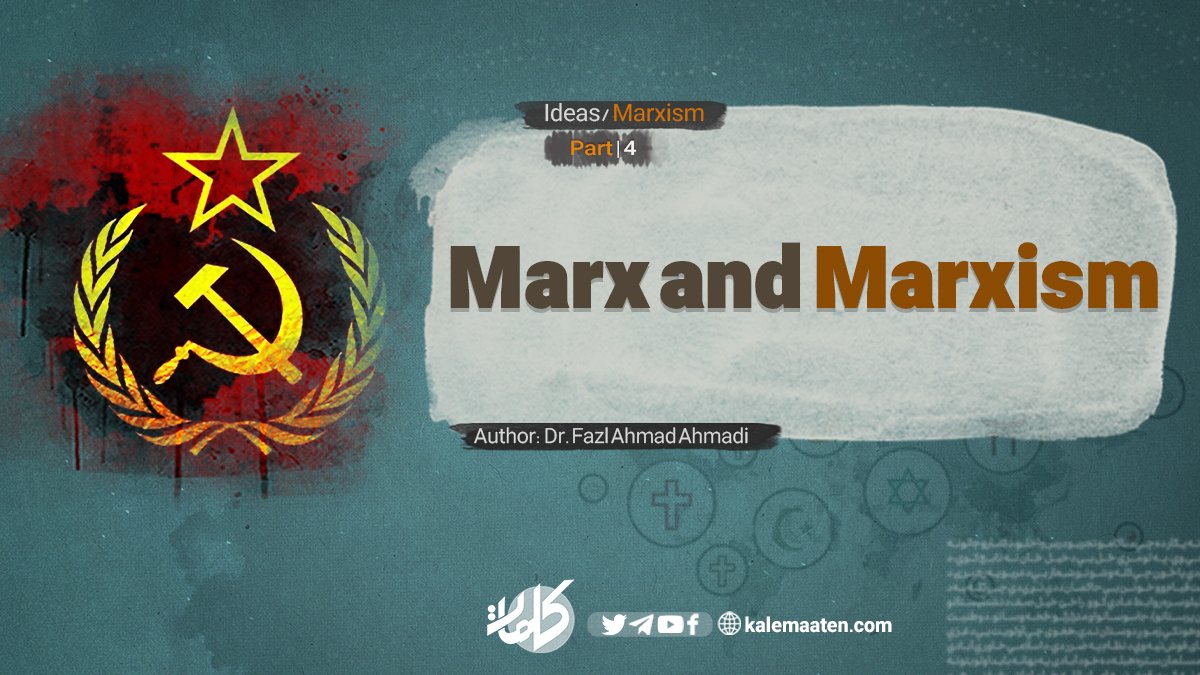
Author: Dr. Fazl Ahmad Ahmadi
Marx and Marxism (Part Four)
3. The Thought of Marxism
There is no doubt that Marxism is one of the most prominent political ideologies of the 20th century. This doctrine manifested itself through the Soviet Union and other communist bloc countries in Europe, Asia, and some other parts of the world. For decades, it competed with liberal democracy, which became the dominant ideology in Western countries, the United States of America, and countries such as Japan in Asia and Canada in North America. Ultimately, with the collapse of the Soviet Union and much of the communist world, Marxism left the stage for its arch-rival and longtime enemy, capitalism.
In other words, the thought of Marxism in the late 19th century, influenced by the internal developments of the capitalist system, challenged the concept of the nation-state in Europe as both an ideology and a social movement. The structural conflict between communism and nationalism was evident not only in their different methods of governance but also in their foundational goals, methods, and outcomes. In fact, a key aspect of Marxism is its focus on internationalism, which contrasts with the tenets of nationalism. Within Marxist ideology, the realization of global convergence necessitates the removal of political boundaries associated with nationalist and capitalist states and their related classes.
In his political program, Marx identified revolution as a necessary tool for the transition from capitalist society to socialism. The realization of such an idea imposed a tremendous cost on the nationalist governments of Europe, culminating in the devastation of the First and Second World Wars. For these countries, maintaining international borders and the capitalist system became a vital priority.
However, the rise of fascism, which itself emerged from the capitalist system, temporarily united Marxism and liberal democracy against a common foe. During the Second World War, the British, American, and French governments allied with the Soviet Union to eliminate Italian fascism and German Nazism. Yet, during the Cold War, ideological conflicts between Marxism and liberal democracy resumed, taking on a political and military character during the Soviet Union’s invasion of Afghanistan (1979). This event directly contributed to the strengthening of the Arab Mujahideen Front and the establishment of Al-Qaeda, which has profoundly influenced the political future of the Islamic world into the last decade.
An important issue is that with the collapse of the Soviet Union, the communist front faced intense scrutiny from both internal and external sources, and the ideal of internationalism failed in both theoretical and practical dimensions. In this context, nationalism, particularly European nationalism expressed through liberal democracy, found an opportunity to renew its strength. The regional and global crises following the collapse of communism have demonstrated that nationalism has successfully confronted the challenges posed by communism up to the present day. European nation-states, despite their cultural, political, and economic convergence under the banner of the European Union, have remained attentive to national ideological, security, and political considerations. Political borders, symbols of nationalism, continue to be prioritized in determining their national and international interests.
When comparing the challenges posed by fascism and communism to European nationalism, it can be noted that fascism, both as an ideology and a movement, emerged later than communism; however, its roots can be traced back to the crises of the capitalist system in the late 19th and early 20th centuries. One can even find the origins of fascism within the framework of European racist nationalism and the peak of the capitalist system, which is imperialism. Racist nationalism differs from democratic nationalism, diverging significantly from the foundations of the Enlightenment era and liberalism, representing an extreme form of nationalism.
By the time of the Russian Revolution (1917), Marxist-Leninist ideology, opposed to liberalism, established the legitimacy of political power within an unprecedented socio-economic system, quickly providing new momentum for left-leaning parties to overthrow their liberal or dictatorial governments.
Although Marxism increasingly spread and gained traction in Europe from the second half of the 19th century, it underwent significant transformations at the beginning of the 20th century, leading to the emergence of various interpretations. Interestingly, some of these interpretations extended beyond the frameworks of Marx and Engels’ original ideas, creating ambiguities for self-identified Marxists.
Continues…


